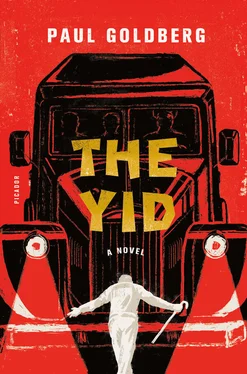And why the knock on Levinson’s door instead of his? Only one explanation satisfies Moisey Semyonovich. It was a clerical error. Someone misfiled his dossier.
* * *
Walking out into the cold morning on February 25, Moisey Semyonovich turns left, toward Drugstore Number Twelve, which he manages.
He heads for the store’s stoop and, standing there, surveys the small park. A group of drunks sits uncomfortably on cold benches, waiting for stores to open. Alkashi, dokhodyagi, men on the edge between withdrawal and the next dose. Vodka, that luxury of luxuries, is out of the question for these poor devils. Most of them drink Svetlana, a cologne, or Valocordin, a stinky alcohol-based anti-anxiety drug sold without prescription. It does neither harm nor good.
Moisey Semyonovich isn’t going to the drugstore. After ascertaining that he isn’t followed, he heads toward the Kazan Station. The sun has not yet risen, and the trolleys have not yet begun to roll.
His destination is Malakhovka, the home of Dr. Aleksandr Sergeyevich Kogan.
He walks into the Kazan Station at 6 a.m., half an hour ahead of the first electric train of the morning.
* * *
As he lies beneath his sheepskin coat on his cot, staring at the light that floods the dacha, Lewis thinks of the final words of the man he murdered.
“Paul Robeson,” he repeats, trembling.
In Magnitogorsk, in 1932, Lewis was proud of having stood up to that new aristocrat.
Take my advice, Comrade Mikhoels. You go get yourself a bug-eyed, toothy Jew and paint him black.
After putting Mikhoels in his place, Lewis returned to the scaffold. He did his best thinking up there, on iced-up wooden planks, swaying with the wind, hanging on like a cat.
Why was he in Magnitogorsk? Why did he, a progressive, a revolutionary, lack a party ticket? Why hadn’t he renounced his seemingly redundant American citizenship? Why were the same questions that haunted him in the land of Jim Crow resurfacing in the context of Comintern?
He loved the idea of defining himself as a member of a class — a proletarian — and, to the extent possible, forgetting the rest. But Negro comrades in America warned him to watch out for Jews, Russians, Lithuanians, Irishmen, and WASPs. Can anyone tolerate being called a baboon while trying to teach Hegel’s dialectic to fellow enlightened workers? And what if Russian comrades of Jewish origin refer to you as an orangutan, presumably not realizing that the word is the same in English?
Perhaps this was something about America, a remnant of slavery that afflicted the Right and the Left alike, Lewis thought. Surely, this wouldn’t exist in the Soviet Union, a country where racial differences didn’t mimic America’s. Other Negro cadres were being sent to the USSR for Party work, but Lewis couldn’t get close enough to the Party, let alone rise high enough to be sent officially to the land of victorious revolution.
Finally, he joined McKee as a welder, and in a matter of months, he was bound for the land where race was purportedly negated, irrelevant. It wasn’t hard to find that job. At a time when capitalism was trudging through an economic crisis, Russia was gearing up for its great leap forward, selling meaningless treasures — melted-down gold, outmoded art — and pumping hard currency into the construction of heavy industry.
He was the first American worker in Magnitogorsk. Bunyan, an engineer, was already there, living in American City, a cluster of bungalows on the city’s edge. Another worker, a radical college-educated white youth named John Scott, would arrive six months after Lewis. Lewis’s first shelter was a tent, where sheepskins made the difference between life and death.
He learned Russian quickly and easily. After less than a year, his ability to join steel earned him the respect of his comrades, and Bunyan’s intervention made him a brigadir , the brigade leader.
So why did people like this Mikhoels seem hell-bent on treating him like a younger brother? They were embarrassingly ignorant, clumsy, and no less evil than their American counterparts. For his own sake, for the sake of the Soviet Union, Lewis was determined to stand in their way.
That night, Lewis took a circuitous route to his room in the barracks.
He stood in line to pick up a loaf of black bread, which was all that could ever be found in the cooperative store.
In line, he ran into Scott, a fellow welder, who was heading to classes at Komvuz, the Communist institute, where he studied Marxism-Leninism alongside future Party workers. A lanky graduate of the University of Wisconsin, Scott had fantasies of becoming the John Reed of the Great Leap Forward. Years later, he would write Behind the Urals: An American Worker in Russia’s City of Steel, a splendid book.
“They call it the ‘nationalities question,’ right?” said Scott, chuckling at Lewis’s Comrade Jim story. “If you are a strict Marxist, it’s all about class, no nationalities, no race.”
“You can’t have your world revolution if you perpetuate that same old shit,” said Lewis.
“Comrade Jim is not much better than Nigger Jim. Is it?”
“Comrade Tom’s no good either.”
“It’s all in the name of reaching the stage of social development where there are no Negroes, no Jews. Just the proletariat, colorless, interbred, free of the prejudice of the past,” said Scott.
“And you believe this, John?”
“Less and less.”
* * *
Lewis walked into the barracks, whistling Dixie, of all things. As he inserted his key in the door, he felt a tap on his shoulder.
“I am sorry, Comrade Lewis, but I was unable to get myself painted,” said the girl in a peculiar, vaguely British accent that has evolved at the English departments at Russia’s institutions of higher learning.
“Sorry, ma’am, I can’t help you none,” said Lewis, smiling broadly and blinking in a manner the movie script surely required. “I be just a simple niggah weldah.”
“Will you invite me in?” she asked.
“To help you write a report for the Comintern?” Lewis was no longer in character.
“I don’t work for the Comintern.”
“Then whoever…”
“I don’t write reports, Comrade Lewis.”
“Then what do you write?”
“I am a literary translator,” she said. “Invite me in, please.”
“Well, come right in, ma’am,” he said, opening the door (he did have a heated room with a door) with a doorman’s sweep of the hand.
“Call me Miss Goldshtein, if you insist on formality. Tatyana Goldshtein,” she said, squeezing past him through the narrow doorway.
* * *
It should be noted that at the meeting with Mikhoels, Lewis realized that the girl in front of him was already his, and — this is even less rational — at that very instant Tatyana Goldshtein came to a corresponding realization.
This notion — this flash of insight — was a formidable puzzle to Lewis. Be it a hunch or a revelation, he shook his head in disbelief and returned to the scaffold. Not being as committed a rationalist, the girl found this occurrence less puzzling.
Let us return to the question Mikhoels posed to Lewis: “How do you like our women?”
Surely by the time Mikhoels understood that the answer was sitting to his right, he developed a craving for tea, but it was too late. The girl missed the entire conversation, except for Lewis’s triumphant finale, his teaching moment.
“To what do I owe the pleasure, Miss Goldshtein?” asked Lewis, closing the door.
“I can’t explain,” she said, and at that instant, they moved toward each other and their lips met.
After some time, she pulled away.
“I hope you don’t think that I do this all the time. I never have. Not like this,” she said, and their lips met again.
Читать дальше












